英文翻译中文
- 格式:doc
- 大小:73.50 KB
- 文档页数:9

中英⽂句⼦翻译在线翻译1. ⼀些唯美的英⽂句⼦,带翻译1、To the world you may be one person, but to one person you may be the world. 对于世界⽽⾔,你是⼀个⼈;但是对于某个⼈,你是他的整个世界。
2、No man or woman is worth your tears, and the one who is, won't make you cry. 没有⼈值得你流泪,值得让你这么做的⼈不会让你哭泣。
3、Never frown, even when you are sad, because you never know who is falling in love with your smile. 纵然伤⼼,也不要愁眉不展,因为你不知是谁会爱上你的笑容。
4、We met at the wrong time, but separated at the right time. The most urgent is to take the most beautiful scenery; the deepest wound was the most real emotions. 我们在错误的时间相遇,在正确的时间却⼜分开。
⾛的最急的是最美的景⾊,伤的最深的是最真的感情。
5、Time would heal almost all wounds. If your wounds have not been healed up, please wait for a short while. 时间⼏乎会愈合所有伤⼝,如果你的伤⼝还没有愈合,请给时间⼀点时间!6、There's a difference between "love" and "like". If you like a flower you will pick it, but if you love a flower, you will water it every day. 爱与喜欢是有区别的。
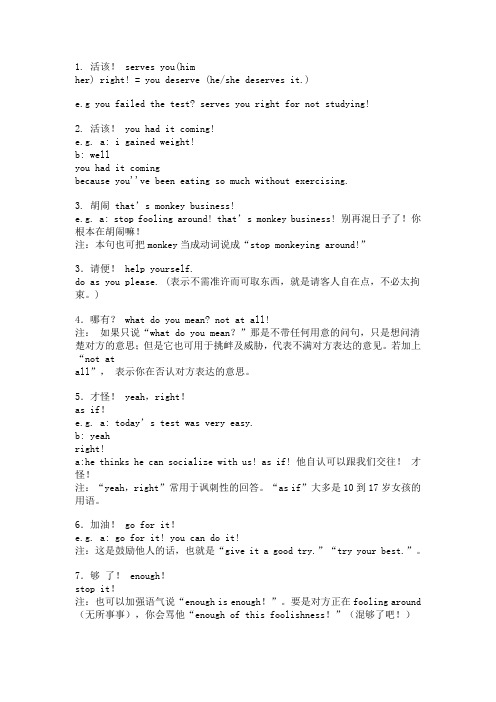
1. 活该! serves you(himher) right! = you deserve (he/she deserves it.)e.g you failed the test? serves you right for not studying!2. 活该! you had it coming!e.g. a: i gained weight!b: wellyou had it comingbecause you''ve been eating so much without exercising.3. 胡闹that’s monkey business!e.g. a: stop fooling around! that’s monkey business! 别再混日子了!你根本在胡闹嘛!注:本句也可把monkey当成动词说成“stop monkeying around!”3.请便! help yourself.do as you please. (表示不需准许而可取东西,就是请客人自在点,不必太拘束。
)4.哪有? what do you mean? not at all!注:如果只说“what do you mean?”那是不带任何用意的问句,只是想问清楚对方的意思;但是它也可用于挑衅及威胁,代表不满对方表达的意见。
若加上“not atall”,表示你在否认对方表达的意思。
5.才怪! yeah,right!as if!e.g. a: today’s test was very easy.b: yeahright!a:he thinks he can socialize with us! as if! 他自认可以跟我们交往!才怪!注:“yeah,right”常用于讽刺性的回答。
“as if”大多是10到17岁女孩的用语。
6.加油! go for it!e.g. a: go for it! you can do it!注:这是鼓励他人的话,也就是“give it a good try.”“try your best.”。
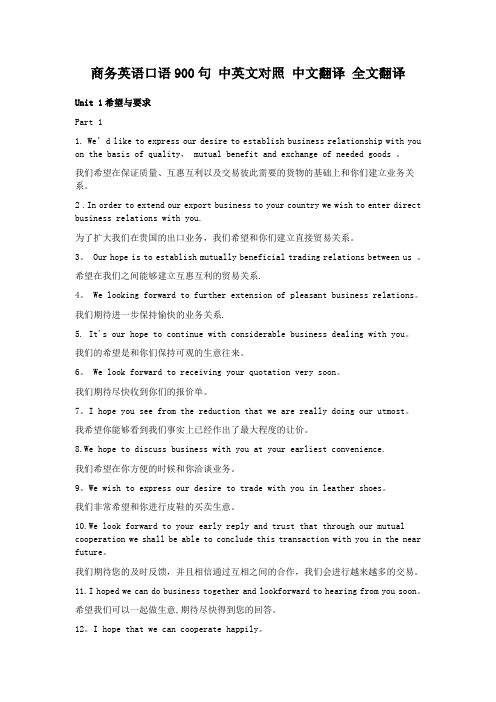
商务英语口语900句中英文对照中文翻译全文翻译Unit 1希望与要求Part 11. We’d like to express our desire to establish business relationship with you on the basis of quality, mutual benefit and exchange of needed goods 。
我们希望在保证质量、互惠互利以及交易彼此需要的货物的基础上和你们建立业务关系。
2 .In order to extend our export business to your country we wish to enter direct business relations with you.为了扩大我们在贵国的出口业务,我们希望和你们建立直接贸易关系。
3。
Our hope is to establish mutually beneficial trading relations between us 。
希望在我们之间能够建立互惠互利的贸易关系.4。
We looking forward to further extension of pleasant business relations。
我们期待进一步保持愉快的业务关系.5. It's our hope to continue with considerable business dealing with you。
我们的希望是和你们保持可观的生意往来。
6。
We look forward to receiving your quotation very soon。
我们期待尽快收到你们的报价单。
7。
I hope you see from the reduction that we are really doing our utmost。
我希望你能够看到我们事实上已经作出了最大程度的让价。
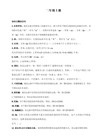

对于一些学英语的人来讲,遇到不懂的单词就希望查一下,经常需要把中文翻译成英文,英文翻译成中文,今天小编就教大家这个小技巧。
操作选用工具:在应用市场下载【录音转文字助手】
操作步骤:
第一步:首先我们在百度手机助手或者应用市场里面搜索:【录音转文字助手】找到以后进行下载并安装。
第二步:接着打开软件就可以看到【录音识别】、【文件识别】、【语音翻译】、【录音机】的四个功能,这里我们就举例说明下【语音翻译】。
第三步:点击橙色的【中文】按钮,开始说中文以后,下面就是翻译的英文。
第四步:点击蓝色的【English】按钮,开始说英文,就可以把你说的英语转成中文了。
以上就是语音翻译的操作步骤了,轻松解放你的双手,大幅提高效率。
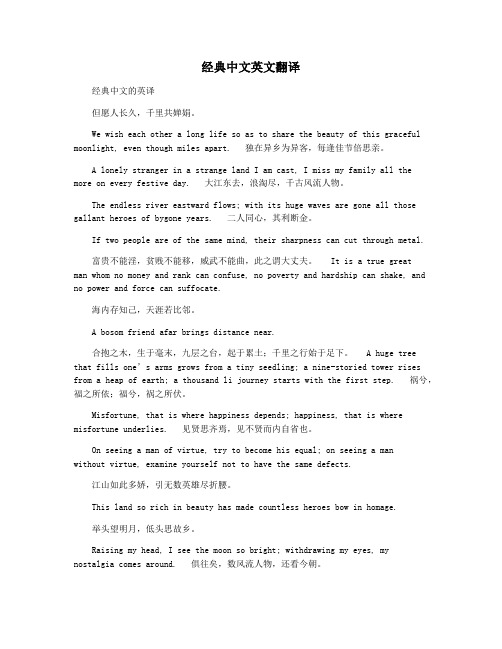
经典中文英文翻译经典中文的英译但愿人长久,千里共婵娟。
We wish each other a long life so as to share the beauty of this graceful moonlight, even though miles apart. 独在异乡为异客,每逢佳节倍思亲。
A lonely stranger in a strange land I am cast, I miss my family all the more on every festive day. 大江东去,浪淘尽,千古风流人物。
The endless river eastward flows; with its huge waves are gone all those gallant heroes of bygone years. 二人同心,其利断金。
If two people are of the same mind, their sharpness can cut through metal.富贵不能淫,贫贱不能移,威武不能曲,此之谓大丈夫。
It is a true greatman whom no money and rank can confuse, no poverty and hardship can shake, and no power and force can suffocate.海内存知己,天涯若比邻。
A bosom friend afar brings distance near.合抱之木,生于毫末,九层之台,起于累土;千里之行始于足下。
A huge tree that fills one’s arms grows from a tiny seedling; a nine-storied tower rises from a heap of earth; a thousand li journey starts with the first step. 祸兮,福之所依;福兮,祸之所伏。

在学习不同的语言时,我们可能会无法确认我们翻译的是否都是正确的,所以我们需要进行在线翻译,将英语翻译成中文,下面就让小编给大家简单介绍一下。
步骤一:将英文翻译成中文的方法是可以直接进入到一点翻译网站中进行翻译的;
步骤二:进入之后就可以找到短句在线翻译,然后点击开始翻译进入;
步骤三:进入之后就可以将需要翻译的语言进行设置了,点击下拉框选择英文翻译中文;
步骤四:之后就可以将英文短句放在左侧的矩形框中,然后点击开始压缩;
步骤五:压缩是需要一定的时间的,我们可以耐心的等待一段时间,短句翻译完成;
步骤六:短句翻译完成之后就可以看到右侧矩形框中会有翻译成功的中文。
以上就是小编给大家简单介绍的在线翻译的方法,希望可以帮助到大家。
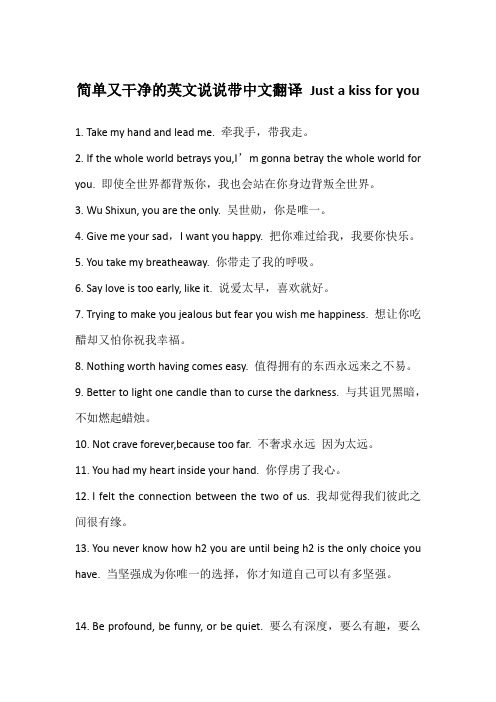
简单又干净的英文说说带中文翻译Just a kiss for you1.Take my hand and lead me. 牵我手,带我走。
2.If the whole world betrays you,I’m gonna betray the whole world for you. 即使全世界都背叛你,我也会站在你身边背叛全世界。
3.Wu Shixun, you are the only. 吴世勋,你是唯一。
4.Give me your sad,I want you happy. 把你难过给我,我要你快乐。
5.You take my breatheaway. 你带走了我的呼吸。
6.Say love is too early, like it. 说爱太早,喜欢就好。
7.Trying to make you jealous but fear you wish me happiness. 想让你吃醋却又怕你祝我幸福。
8.Nothing worth having comes easy. 值得拥有的东西永远来之不易。
9.Better to light one candle than to curse the darkness. 与其诅咒黑暗,不如燃起蜡烛。
10.Not crave forever,because too far. 不奢求永远因为太远。
11.You had my heart inside your hand. 你俘虏了我心。
12.I felt the connection between the two of us. 我却觉得我们彼此之间很有缘。
13.You never know how h2 you are until being h2 is the only choice you have. 当坚强成为你唯一的选择,你才知道自己可以有多坚强。
14.Be profound, be funny, or be quiet. 要么有深度,要么有趣,要么安静。
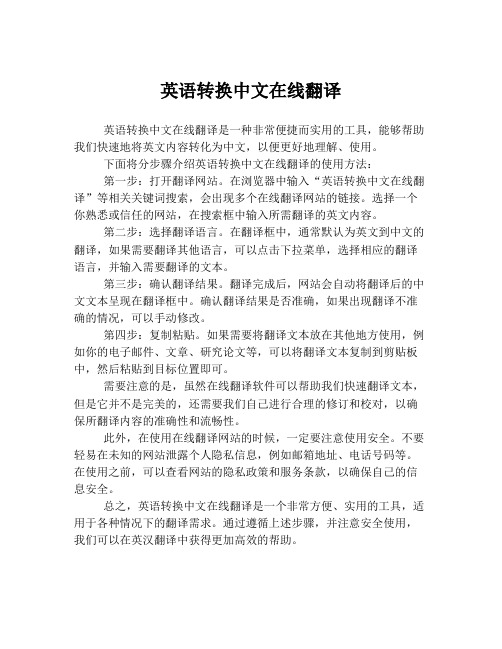
英语转换中文在线翻译
英语转换中文在线翻译是一种非常便捷而实用的工具,能够帮助我们快速地将英文内容转化为中文,以便更好地理解、使用。
下面将分步骤介绍英语转换中文在线翻译的使用方法:
第一步:打开翻译网站。
在浏览器中输入“英语转换中文在线翻译”等相关关键词搜索,会出现多个在线翻译网站的链接。
选择一个你熟悉或信任的网站,在搜索框中输入所需翻译的英文内容。
第二步:选择翻译语言。
在翻译框中,通常默认为英文到中文的翻译,如果需要翻译其他语言,可以点击下拉菜单,选择相应的翻译语言,并输入需要翻译的文本。
第三步:确认翻译结果。
翻译完成后,网站会自动将翻译后的中文文本呈现在翻译框中。
确认翻译结果是否准确,如果出现翻译不准确的情况,可以手动修改。
第四步:复制粘贴。
如果需要将翻译文本放在其他地方使用,例如你的电子邮件、文章、研究论文等,可以将翻译文本复制到剪贴板中,然后粘贴到目标位置即可。
需要注意的是,虽然在线翻译软件可以帮助我们快速翻译文本,但是它并不是完美的,还需要我们自己进行合理的修订和校对,以确保所翻译内容的准确性和流畅性。
此外,在使用在线翻译网站的时候,一定要注意使用安全。
不要轻易在未知的网站泄露个人隐私信息,例如邮箱地址、电话号码等。
在使用之前,可以查看网站的隐私政策和服务条款,以确保自己的信息安全。
总之,英语转换中文在线翻译是一个非常方便、实用的工具,适用于各种情况下的翻译需求。
通过遵循上述步骤,并注意安全使用,我们可以在英汉翻译中获得更加高效的帮助。

中文精彩短语英文翻译1.记住该记住的,忘记该忘记的。
改变能改变的,接受不能改变的Remember what should be remembered, and forget what should be forgotten.Alter what is changeable, and accept what is mutable.2.能冲刷一切的除了眼泪,就是时间,以时间来推移感情,时间越长,冲突越淡,仿佛不断稀释的茶Apart from tears, only time could wear everything away. While feeling is being processed by time, conflicts would be reconciled as time goes by, just like a cup of tea that is being continuously diluted.3.怨言是上天得至人类的供物,也是人类祷告中最真诚的部分Complaints are the greatest offerings that God obtains from human beings, as well as the most faithful prayers human beings might utter to God.4.智慧的代价是矛盾。
这是人生对人生观开的玩笑。
Wisdom appears in contradiction to itself, which is a trick life plays on philosophy of life.5.世上的姑娘总以为自己是骄傲的公主(除了少数极丑和少数极聪明的姑娘例外)Girls always look on themselves as proud princesses, with the exception of a small number of either extremely ugly or exceedingly smart ones.6.如果敌人让你生气,那说明你还没有胜他的把握It can be inferred that you lack confidence in a victory over your rivals from the fact that you're irritable against them.7.如果朋友让你生气,那说明你仍然在意他的友情From that you would get angry with your friends, we can conclude you sitll care about the friendship between you.8.令狐冲说"有些事情本身我们无法控制,只好控制自己。

英文文章翻译成中文3篇不容置疑,英语文章由段落构成,段落又由句子构成。
段落的构成是文章的基石,段落好与坏直接影响文章意义的表达。
下面是店铺带来的英文文章翻译成中文,欢迎阅读!英文文章翻译成中文篇一Happiness is a journeyWe always convince ourselves that life will be better after we get married, have a baby, than another. Then we are frustrated that the kids aren't old enough and we'll be more content when they are. After that we're frustrated that we have teenagers to deal with. we will certainly be happy when they are out of that stage.我们总是说服自己,认为当我们结婚、生子后日子会过的更加舒心些。
然后我们又被那些小鬼的不懂事搞得不顺心,当他们大了些后,情况会好些吧。
当孩子到了青春期的时候,(有时)对于如何跟他们好好交流又会使我们很无措。
我们都深信当他们过了那个年龄段后,事情就会有些转机。
We always tell ourselves that our life will be complete when our spouse gets his or her act together. when we get a nice car, and are able to go on a nice vocation when we retire. The truth is, there's no better time than right now. If not now, when? our life will always be filled with challenges. It's best to admit this to ourselves and decide to be happy anyway.我们总是对自己说,当另一半有条理的过活时,(我们的)人生就会很圆满。
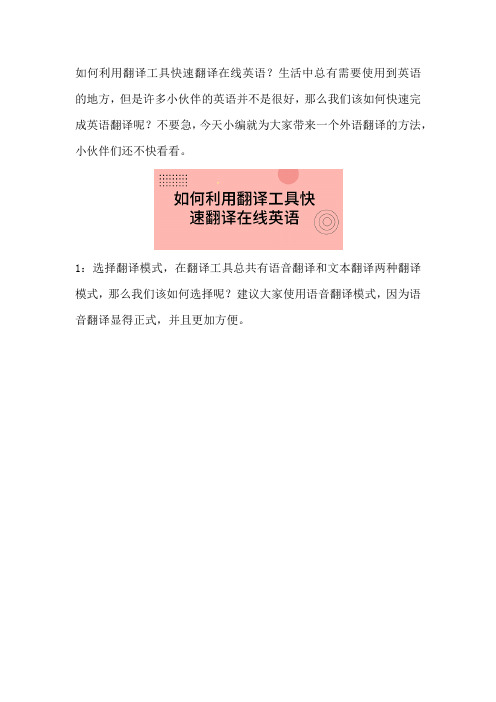
如何利用翻译工具快速翻译在线英语?生活中总有需要使用到英语的地方,但是许多小伙伴的英语并不是很好,那么我们该如何快速完成英语翻译呢?不要急,今天小编就为大家带来一个外语翻译的方法,小伙伴们还不快看看。
1:选择翻译模式,在翻译工具总共有语音翻译和文本翻译两种翻译模式,那么我们该如何选择呢?建议大家使用语音翻译模式,因为语音翻译显得正式,并且更加方便。
2:选择语种和目标语种,源语种为中文,但是中文有中文繁体和中文简体的区分,小伙伴们可以根据自己的说话口音进行选择,而目标语种我们选择英语即可。
3:开始进行翻译,点击最下角的中文按钮,开始说话,录音结束后点击完成按钮,进入翻译页面。
再次提醒大家,在于英国人交流时一定要事先了解对方的民族文化,比如“星期五”和“13”这两个数字是英国人非常忌讳的,数字“666”他们也很不喜欢。
4:翻译结果会在语音播放的同时也会有文字的出现,如果事先没有调大音量,对方没有听清,没有关系,我们可以点击文字中的喇叭,进行重复播放。
5:在我们的手机翻译工具“语音翻译器”中带有英语翻译中文的功能,点击下角的英文按钮,说出英文,开始进行英语对中文的翻译。
6:如果是较为喧哗的场合,你可以与外国人通过文字的形式交流,点击文本框,里面有一个文字全屏展示功能。
7:收藏夹,点击文本框中的收藏按钮后,你可以在左上角的设置按
钮中找到收藏夹,在这里对你所收藏的文本进行各种编辑。
以上就是小编分享的关于如何快速翻译在线英语的方法,希望可以帮助到你。
旅游时一定要事先看好旅行攻略,了解当地的风俗文化,以免引起不必要的误会,祝你旅行愉快。
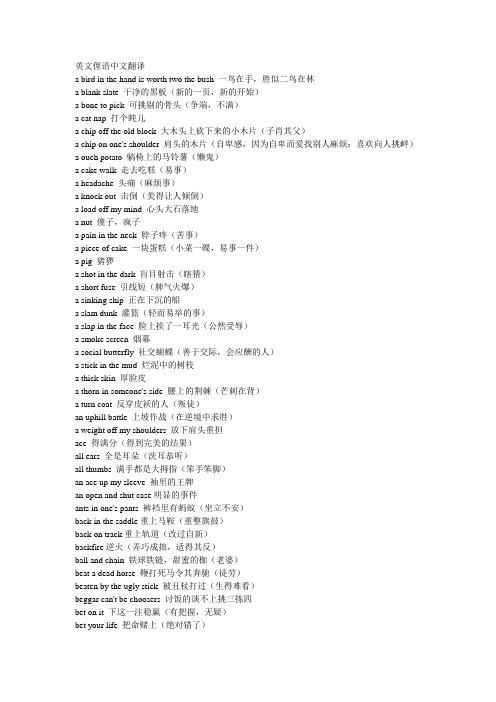
英文俚语中文翻译a bird in the hand is worth two the bush 一鸟在手,胜似二鸟在林a blank slate 干净的黑板(新的一页,新的开始)a bone to pick 可挑剔的骨头(争端,不满)a cat nap 打个盹儿a chip off the old block 大木头上砍下来的小木片(子肖其父)a chip on one's shoulder 肩头的木片(自卑感,因为自卑而爱找别人麻烦;喜欢向人挑衅)a ouch potato 躺椅上的马铃薯(懒鬼)a cake walk 走去吃糕(易事)a headache 头痛(麻烦事)a knock out 击倒(美得让人倾倒)a load off my mind 心头大石落地a nut 傻子,疯子a pain in the neck 脖子疼(苦事)a piece of cake 一块蛋糕(小菜一碟,易事一件)a pig 猪猡a shot in the dark 盲目射击(瞎猜)a short fuse 引线短(脾气火爆)a sinking ship 正在下沉的船a slam dunk 灌篮(轻而易举的事)a slap in the face 脸上挨了一耳光(公然受辱)a smoke screen 烟幕a social butterfly 社交蝴蝶(善于交际,会应酬的人)a stick in the mud 烂泥中的树枝a thick skin 厚脸皮a thorn in someone's side 腰上的荆棘(芒刺在背)a turn coat 反穿皮袄的人(叛徒)an uphill battle 上坡作战(在逆境中求胜)a weight off my shoulders 放下肩头重担ace 得满分(得到完美的结果)all ears 全是耳朵(洗耳恭听)all thumbs 满手都是大拇指(笨手笨脚)an ace up my sleeve 袖里的王牌an open and shut case明显的事件ants in one's pants 裤裆里有蚂蚁(坐立不安)back in the saddle重上马鞍(重整旗鼓)back on track重上轨道(改过自新)backfire逆火(弄巧成拙,适得其反)ball and chain 铁球铁链,甜蜜的枷(老婆)beat a dead horse 鞭打死马令其奔驰(徒劳)beaten by the ugly stick 被丑杖打过(生得难看)beggar can't be choosers 讨饭的谈不上挑三拣四bet on it 下这一注稳赢(有把握,无疑)bet your life 把命赌上(绝对错了)better half 我的另一半between a rack and a hard place 进退维谷(前有狼后有虎)big headed 大脑袋(傲慢,自大)bigger fish to fry 有更大的鱼要炸(有更重要的事要办)bite off more than one can chew 贪多嚼不烂bite the bullet 咬子弹(强忍痛苦)birds of a feather flock together 羽毛相同的鸟总飞成一群(物以类聚)blow up in you face 在眼前爆炸(事情完全弄砸了)bologna 胡说,瞎说break a let 折断一条腿(表演真实,演出成功)break the ice 破冰(打破僵局)bright聪明,灵光brown nose 讨好,谄媚bug somebody 使人讨厌bull in a china shop 瓷器店里的蛮牛(笨拙的人,动辄弄坏东西的人)bump into 撞上(巧遇)burn brides 烧桥(过河拆桥)burst your bubble 扎破泡泡(打破人的幻想,煞风景)bury one's head in the sand把头埋在沙里(自欺欺人)butterfingers奶油手指(抓不稳东西的人)butterflies in my stomach肚里有只蝴蝶(心里紧张,七上八下)buy the farm买下农场(归道山,死了)call it a night一日事毕,可以睡觉了can't teach an old dog new tricks老狗学不会新把戏cash in my chips兑换筹码(睡觉,就寝)chicken鸡(胆小鬼)circle the wagons把篷车围成一圈(严阵以待)clean up one's act自我检点,自我改进come down in bucket倾盆大雨come down in sheets整片整片地下(倾盆大雨)cool your lips冷静下来cost someone an arm and a leg要花上一条胳膊一条腿(代价昂贵)count on something /doing something 这事靠得住count your chickens before they hatch 蛋还没孵化,先数小鸡crock 破瓦片(无用之物,废话)cross the line 跨过线(做得太过分了)cross that bridge when we come to it 到了桥头就过桥(船到桥头自然直)cry over spilled milk 为泼了牛奶而哭(为过去的失败而懊丧)cushion the blow 给垫着点儿(说话绵软一点,以免打击太重)cut to the chase 抄捷径去追猎物(不绕圈子,开门见山,单刀直入)daily grind 例行苦事,每天得干的苦工days are numbered 来日无多dead center 正当中deadend street 死路,死巷子dog 狗(丑八怪)domino effect 骨牌效应don't hold your breath 别憋着呼吸(别期望太高)don't look a gift horse in the mouth 赠马不看牙(收人礼物别嫌好道歹)down to the wire 最后关头down under 南边(常指面半球的澳洲)downhill from here 从此都是下坡路(自此每况愈下)drop the ball 掉了球(失职)empty nest 空巢(儿女长大离家)every cloud has a silver lining 乌云也有银边(祸兮福所倚,塞翁失马)fall into place 落实,就绪fender bender 撞弯保险杠的车祸(小车祸)fight tooth and nail 爪牙并施,拚命抵抗fine line 细线(微妙的差别)fish out of water 如鱼离水flash in the pan 淘金盆里的反光(空欢喜一场,好景不长)fork in the road 岔路fox 狐狸(并无贬意)framed 被陷害,遭栽赃full throttle 加足马力get a foot in the door 一脚已经进了门里(获得立足点,占一份)get hitched 拴起来(结婚)get off on the wrong foot 起步便错(第一印象不佳)get the ball rolling 让球滚起来(动起手来)get/give the green light 绿灯亮了(获准行动)get up on the wrong side of the bed 起床下错边give the shirt off one's back 连衬衫都肯脱给人(慷慨成性)go one step too far 多走了一步(做得太过分了)go out on a limb 爬高枝(担风险)go overboard 过火go to hell in a hand basket 坐着吊篮下地狱(一坏不可收拾)go to one's head 上头上脸,冲昏头脑go under 沉没(破产)goose bumps 鸡皮疙瘩grasp for straws 抓稻草(绝望中的挣扎,快要淹死的人连漂浮的稻草也抓)guts 胆子hot 惹火have one's cake and eat it too 既想留着蛋糕,又想吃(既要鱼,又要熊掌)hindsight is 20/20 事后的先见之明hit stride 脚步走顺了hit the books 撞书(用功)hit the hay 倒在稻草上(睡觉、就寝)hit the jackpot 中了头彩hit the road 上路hold a candle to 给他拿蜡烛都不配(元不能相比)hold the key to my heart 掌管我心灵的钥匙hold your horses 勒住你的马(慢来)hang somebody out to dry 把……晾起来了(把……坑苦了)in one's back pocket 在某人裤子后口袋里(是某人的囊中之物)in the dark 在黑暗中(茫然,什么也不知道)in the lime light 站在聚光灯圈里(出风头)in the spotlight 站在聚光灯圈里(出风头)it's Greek to me 希腊文(天书)in the middle of nowhere 周围什么也没有(前不见村,后不着店)joined at the hip 连体婴(死党,从不分开的两个人)jump the gun 枪未响先偷跑(抢先)just what the doctor ordered 正是大夫说的(对症下药)keep an ear to the ground 一耳贴地(注意新动向)keep one's fingers crossed/cross one's fingers 把手指交叉成十字架(暗祈上苍保佑)kick the bucket 踢水桶(翘辫子)kill two birds with one stone一箭双雕,一举两得kiss up to 讨好kitty corner 小猫的角落(斜对角)knuckle sandwich 指节骨三明治(饱以老拳)landslide 山崩(压倒性的胜利)last straw 最后一根稻草left a bitter taste in one's mouth 留下满嘴苦味(留下不愉快的回忆)left hanging 被晾起来了(被挂起来,悬而不决)let sleeping dogs lie 别惊动睡着的狗(别无事生非,过去的事不要再提)let the cat out of the bag 放出袋中猫(泄密,说漏嘴)light a fire under your butt 在屁股下点一把火(促其行动)light at the end of the tunnel 隧道末端的光(一线希望)like hot cakes 象刚出炉的蛋糕(很受欢迎的东西,抢手货)like looking for a needle in a haystack 如同在稻草堆里找一根针(大海捞针)like pulling hen's teeth 跟拔母鸡的牙一样(艰苦不堪)like shooting fish in a barrel 桶里射鱼(瓮中捉鳖)like stealing candy from a baby 娃娃手里骗糖(易事)ling winded 长舌,碎嘴loose cannon 松动的大炮(一触即发的脾气)lose one's marbles 疯了,神智不清low blow 不正当的攻击,下流手段make a mountain out of a molehill 把小土堆说成大山(小题大作)make him and break the mold 上帝造了他以后就把模型砸了(再没有跟他一样的人了)Monday morning quarterback 星期一早晨的四分卫(马后炮)monkey business 猢狲把戏(胡闹)monkey on one's back 背上的猴子(难以摆脱的负担)more than you can shake a finger at 屈指难数more than one way to skin a cat 剥猫皮各有巧妙不同(另有办法)music to my ears 爱听的话my old man 我的老头(我父亲)nail in the coffin 棺材钉子(致使的一击,决定成败的最重要因素)neck and neck 马脖子靠着马脖子(齐头并进,不分轩轾)no sweat不出汗(没什么大不了)not dealing with a full deck 脑子里少几张牌(头脑不正常)nothing will leave these walls 话不传出这四堵墙之外(言不入六耳)off the charts 好得没治了off the deep end 暴跳如雷off the fop of one's head 临时一想,随口一说on a good note 尽欢而散on a roll 做得很顺,势如破竹on cloud nine 九霄云上on fire 着火了(红火,手气旺)on my nerves 惹我心烦on pins and needles 如坐针毡,坐立不安on tap 桶装啤酒(现成的,预备好的)on the back burner 搁在靠后的炉子上(靠边站)on the ball 看球看得准(做事有准备,有把握)on the edge of my seat 坐在椅子前沿(专心地看和听)on the rocks 触礁,搁浅;加冰块on the same page 在同一页上(进度相同)on the tip of my tongue 话到舌尖,呼之欲出once in a blue moon 出蓝月亮的时候(稀罕,少见)one foot in the grave 一脚已经入了坟(入土三尺)one of a kind 独一无二one step ahead of you 领先你一步out of the pan and into the fire 跳出锅里,掉进火里(每况愈下)out of the picture 不在画面里out of this world 人世所无,只应天上有pale in comparison 相形失色peas in a pod一荚之豆(好哥儿们)pieces come together 拼图游戏凑成图案(诸事顺利,达成完美结果)play it by ear不用看谱(随机应变)plenty of other fish in the sea 海里的鱼多得很(天涯何处无芳草)poker face 扑克面孔(喜怒不形于色)pop the question 提出大问题(求婚)pot calling the kettle black 锅嫌壶黑(五十步笑百步)pull oneself up by one's bootstraps 拎着鞋带把自己提起来(凭自己的力量重新振作起来)pull the rug out from underneath someone 地毯从脚下被抽出(事出意外)punch your lights out 揍得你两眼发黑put all of one's eggs in one basket 鸡蛋都放在一个篮子里(孤注一掷)put one's foot in one's mouth 把脚丫放进嘴里(说错话了)put one's nose to the grindstone 鼻子冲着磨刀石(专心工作)put the cart before the horse 车在马前(本末倒置)put up the white flag 竖白旗(投降,放弃)rain on your parade 游行时下雨(扫兴,浇冷水)rain cats and dogs 天上下猫,天上下狗(倾盆大雨)raise the bar 提高横竿(更上一层楼)read someone like a book 对这个人一目了然red handed 趁着手上的血还没洗净时候抓住,在犯罪现场被逮red tape(扎公文的)红带子,官样文章(繁文缛节)right down my alley 恰是我的路(正能者多劳的胃口)rob the cradle 劫摇篮(老牛吃嫩草)rock the boat晃船(无事生非,制造不安定)rumple my feathers 逆指羽毛(逆批龙鳞)seamless 天衣无缝secret weapon 秘密武器see right through someone 一眼看穿,洞烛其奸shoot for the stars sick and tired 射星星(立志要高)sit shotgun 厌烦six one way, half a dozen the other一边六个,一边半打(半斤八两)skate on thin ice 在薄冰上滑冰(如履薄冰,身历险境)skeleton in one's closet 壁橱里的骷髅(不可告人的事)skin and bones 皮包骨sleep on it 睡在上面(考虑一晚上)small talk 寒喧,闲聊smooth sailing 一帆风顺snowball 滚雪球,越滚越大snowball's chance in hell 雪球进了地狱(希望不大)spark 火星(来电)spineless 没脊梁(没有骨气)split hairs 细分头发(吹毛求疵)stab in the back 背后插刀(遭人暗算)stallion 千里驹(貌美体健的男人)stand someone up 对方失约,让人空等stick a fork in him, he's done 用叉子戳他一下看看,他烤熟了吧stop and smell the roses 停下来闻玫瑰(享受生活)straw that broke the camel's back压断骆驼脊梁的稻草(最后致命的一击)straight from the horse's mouth 听马说的(根据最可靠的消息来源)strike out 三振出局stud 种马(貌美体健的男人)swing for the fence 打全垒打take a hike 走路(滚蛋)take a rain check 因雨停赛时送给观众下次免费来看的票(另一次机会)take off 动身take one for the team 为了全队挨一下(为了集体利益,牺牲个人利益)take the word right out of someone's mouth 替我说了(你所说的正是我想要说的)the ball is in someone's court 球在你那边(该你行动了)the walls have ears 墙有耳朵(隔墙有耳)the whole nine yards 整整九码(一举成功,美式足球的攻方一次需推进十码)throw in the towel 扔毛巾(认输,放弃)tie the knot 打结(结婚)toe the line 循规蹈矩,沿着线走tongue in cheek 闲磕牙(挖苦地)too many cooks in the kitchen 厨房里厨子太多(筑室道谋,三个和尚没水渴)twinkle in your mother's eye 母亲眼中的一闪灵光(未出娘胎)twisted 脾气拧,别扭two left feet 有两左脚(笨手笨脚)under my skin 钻到我的皮下(让我极不舒服)under the weather 受了风寒until the cows come home 等到牛回家(空等,白等)until you are blue in the face 干到脸发青(也是白干)unwind 放松发条(轻松下来)up for grabs 大家有份up in the air 挂在空中(悬而未决)walk in someone's shoes 穿他的鞋走走看(设身处地,经历相同)walk on air(高兴得)脚不点地,飘飘然washed up 像是洗过的(筋疲力尽,力气都放完了)water off a duck's back 鸭背的水珠(马耳东风)water under the bridge 桥下的水(逝水,覆水)when hell freezes over 地狱结冰(绝不可能的事)weed out 除去杂草(淘汰)well rounded全能,全才when pigs fly 猪飞的时候(绝不可能)not lift a finger 连手指都不动一动(袖手旁观)wound up 上足发条(紧张,兴奋)wrapped around his/her little finger 化为绕指柔(玩弄于股掌之间)wring his neck 扭断他的脖子1、Keep your chin up. 山重水复疑无路,柳暗花明又一春。
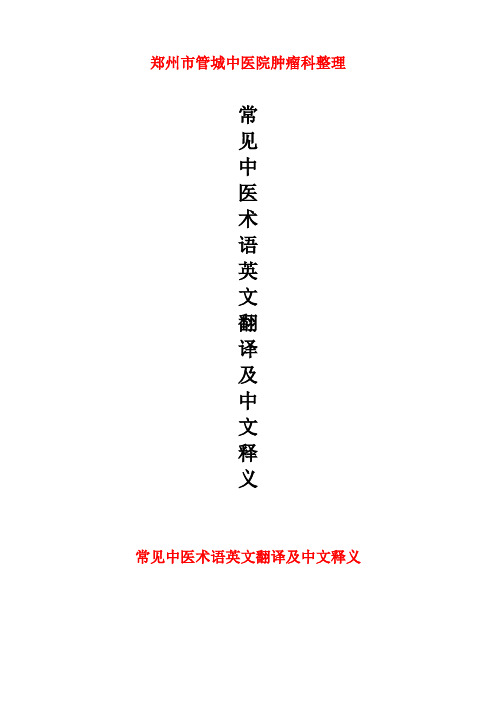
郑州市管城中医院肿瘤科整理常见中医术语英文翻译及中文释义常见中医术语英文翻译及中文释义中医术语的中英文参考对照治则principle of treatment 在对临床的具体立法、处方、用药等具有普遍的指导意义,因而在治疗疾病时必须遵循的基本原则。
治病求本treatment aiming at its pathogenesis 针对产生疾病的根本原因进行治疗的原则。
急则治标symptomatic treatment in acute condition 与缓则治本相对而言,在大出血、暴泻、剧痛等标症甚急的情况,及时救治标病。
缓则治本radical treatment in chronic case 与急则治标相对而言,针对病势缓和、病情缓慢的情况,从本病的病机出发,采取调理、补益为主的治疗原则。
标本兼治treating both manifestation and root cause of disease 针对病证出现的标本并重的情况,采用治标与治本相结合的治疗原则。
治未病preventive treatment of disease 采取一定的措施防止疾病产生和发展的治疗原则,包括未病先防和既病防变两个方面。
同病异治treating same disease with different methods 表现相同的病证,可因人、因时、因地的不同,或由于病情的发展、病机的变化、病型的各异、正邪消长等差异,采取不同治法的治疗原则。
异病同治treating different diseases with same method 表现不同的病证,由于发病机理相同,采取相同治法的治疗原则。
因时制宜treatment in accordance with seasonal conditions 考虑到时令气候寒热燥湿的不同而选择适宜的治法、方药的治疗原则。
因地制宜treatment in accordance with local conditions 考虑到地域环境的不同而选择适宜的治法、方药的治疗原则。
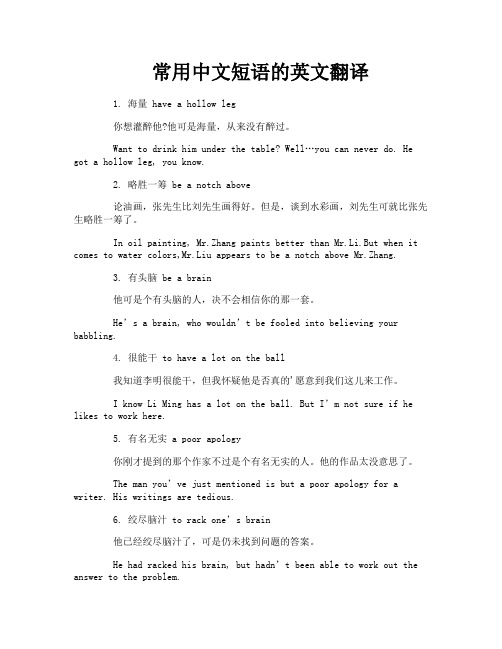
常用中文短语的英文翻译1. 海量 have a hollow leg你想灌醉他?他可是海量,从来没有醉过。
Want to drink him under the table? Well…you can never do. He got a hollow leg, you know.2. 略胜一筹 be a notch above论油画,张先生比刘先生画得好。
但是,谈到水彩画,刘先生可就比张先生略胜一筹了。
In oil painting, Mr.Zhang paints better than Mr.Li.But when it comes to water colors,Mr.Liu appears to be a notch above Mr.Zhang.3. 有头脑 be a brain他可是个有头脑的人,决不会相信你的那一套。
He’s a brain, who wouldn’t be fooled into believing your babbling.4. 很能干 to have a lot on the ball我知道李明很能干,但我怀疑他是否真的'愿意到我们这儿来工作。
I know Li Ming has a lot on the ball. But I’m not sure if he likes to work here.5. 有名无实 a poor apology你刚才提到的那个作家不过是个有名无实的人。
他的作品太没意思了。
The man you’ve just mentioned is but a poor apology for a writer. His writings are tedious.6. 绞尽脑汁to rack one’s brain他已经绞尽脑汁了,可是仍未找到问题的答案。
He had racked his brain, but hadn’t been able to work out the answer to the problem.7. 没骨气 have no guts.真没想到小高那么没骨气,竟然嫁给了坑害过她父亲的人。
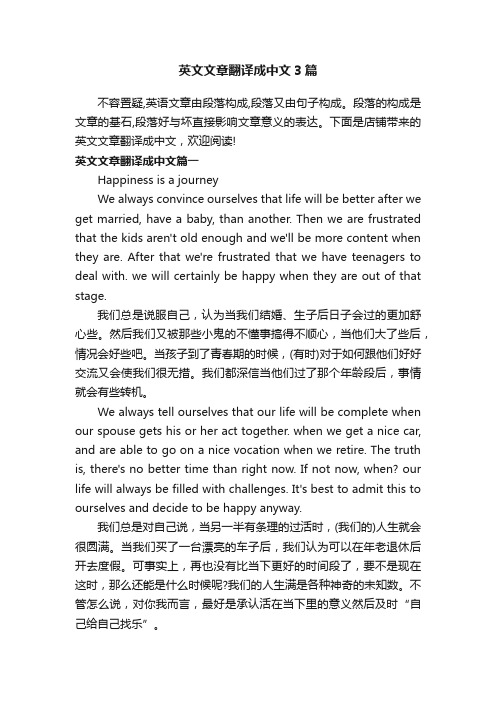
英文文章翻译成中文3篇不容置疑,英语文章由段落构成,段落又由句子构成。
段落的构成是文章的基石,段落好与坏直接影响文章意义的表达。
下面是店铺带来的英文文章翻译成中文,欢迎阅读!英文文章翻译成中文篇一Happiness is a journeyWe always convince ourselves that life will be better after we get married, have a baby, than another. Then we are frustrated that the kids aren't old enough and we'll be more content when they are. After that we're frustrated that we have teenagers to deal with. we will certainly be happy when they are out of that stage.我们总是说服自己,认为当我们结婚、生子后日子会过的更加舒心些。
然后我们又被那些小鬼的不懂事搞得不顺心,当他们大了些后,情况会好些吧。
当孩子到了青春期的时候,(有时)对于如何跟他们好好交流又会使我们很无措。
我们都深信当他们过了那个年龄段后,事情就会有些转机。
We always tell ourselves that our life will be complete when our spouse gets his or her act together. when we get a nice car, and are able to go on a nice vocation when we retire. The truth is, there's no better time than right now. If not now, when? our life will always be filled with challenges. It's best to admit this to ourselves and decide to be happy anyway.我们总是对自己说,当另一半有条理的过活时,(我们的)人生就会很圆满。

我们有时候在微信上的聊天的时候,遇到外国人,由于英文水平不够,所以交流起来难免会有点尴尬,下面教大家几种微信上如何将英文翻译成中文的方法,聊天的时候比较适用,具体操作步骤如下:
1、使用微信上的小程序,点击微信的搜索图标,搜索可以翻译文字的小程序。
2、然后点击打开可以翻译文字的工具,打开之后,就可以使用了。
3、将你需要翻译的英文输入或者复制粘贴到上面的框框内。
4、小程序默认是中文翻译成英文,调整一下你需要翻译的语言,将目标语言调整为——简体中文。
5、最后点击“立即翻译”这个按钮,开始翻译上面的一段英文,翻译结果出来后,可点击旁边的按钮复制结果。
怎么样,这个翻译文字的方法挺实用的吧,感兴趣的同学可以去微信上翻译试试看哦。

【导语】英语诗歌中采⽤的的丰富的修辞⼿法及其创设的优美意境,可以提⾼学⽣的⽂学鉴赏能⼒和审美能⼒。
下⾯是由⽆忧考带来的英⽂诗翻译成中⽂,欢迎阅读!【篇⼀】英⽂诗翻译成中⽂精选 Mutability ⽆常 Percy Bysshe Shelley 波西·⽐希·雪莱 The flower that smiles today Tomorrow dies; All that we wish to stay Tempts and then flies. 今天还微笑的花朵明天就会枯萎;我们愿留贮的⼀切诱⼀诱⼈就飞。
What is this world's delight? Lightning that mocks the night, Brief even as bright. 什么是这世上的欢乐? 它是嘲笑⿊夜的闪电,虽明亮,却短暂。
Virtue, how frail it is! Friendship how rare! Love, how it sells poor bliss For proud despair! 唉,美德!它多么脆弱! 友情多不易看见! 爱情售卖可怜的幸福,你得拿绝望交换! But we, though soon they fall, Survive their joy, and all Which ours we call. 但我们仍旧得活下去,尽管失去了这些喜悦,以及"我们的"⼀切。
Whilst skies are blue and bright, Whilst flowers are gay, 趁天空还明媚,蔚蓝,趁着花朵鲜艳, Whilst eyes that change ere night Make glad the day; 趁眼睛看来⼀切美好,还没临到夜晚; Whilst yet the calm hours creep, Dream thou—and from thy sleep Then wake to weep. 呵,趁现在时流还平静,作你的梦吧——且憩息,等醒来再哭泣。
Accounting ethicsBarron's Kathleen ElliottAbstractAccounting ethics is primarily a field of applied ethics, the study of moral values and judgments as they apply to accountancy. It is an example of professional ethics. Accounting ethics were first introduced by Luca Pacioli, and later expanded by government groups, professional organizations, and independent companies. Ethics are taught in accounting courses at higher education institutions as well as by companies training accountants and auditors.Key words:Accounting Ethics EducationContents1 Importance of ethics2 History3 Teaching ethics4 Accounting scandals1.Importance of ethicsThe nature of the work carried out by accountants and auditors requires a high level of ethics. Shareholders, potential shareholders, and other users of the financial statements rely heavily on the yearly financial statements of a company as they can use this information to make an informed decision about investment. They rely on the opinion of the accountants who prepared the statements, as well as the auditors that verified it, to present a true and fair view of the company. Knowledge of ethics can help accountants and auditors to overcome ethical dilemmas, allowing for the right choice that, although it may not benefit the company, will benefit the public who relies on the accountant/auditor's reporting.Most countries have differing focuses on enforcing accounting laws. In Germany, accounting legislation is governed by "tax law"; in Sweden, by "accounting law"; and in the United Kingdom, by the "company law". In addition, countries have their own organizations which regulate accounting. For example, Sweden has the Bokföringsnämden (BFN - Accounting Standards Board), Spain the Instituto de Comtabilidad y Auditoria de Cuentas (ICAC), and the United States the Financial Accounting Standards Board (FASB).2.HistoryLuca Pacioli, the "Father of Accounting", wrote on accounting ethics in his first book Summa de arithmetica, geometria, proportioni, et proportionalita, published in 1494. Ethical standards have since then been developed through government groups, professional organizations, and independent companies. These various groups have led accountants to follow several codes of ethics to perform their duties in a professional work environment. Accountants must follow the code of ethics set out by the professional body of which they are a member. United States accounting societies such as the Association of Government Accountants, Institute of Internal Auditors, and the National Association of Accountants all have codes of ethics, andmany accountants are members of one or more of these societies.In 1887, the American Association of Public Accountants (AAPA) was created; it was the first step in developing professionalism in the United States accounting industry. By 1905, the AAPA's first ethical codes were formulated to educate its members. During its twentieth anniversary meeting in October 1907, ethics was a major topic of the conference among its members. As a result of discussions, a list of professional ethics was incorporated into the organization's bylaws. However, because membership to the organization was voluntary, the association could not require individuals to conform to the suggested behaviors. Other accounting organizations, such as the Illinois Institute of Accountants, also pursued discussion on the importance of ethics for the field. The AAPA was renamed several times throughout its history, before becoming the American Institute of Certified Public Accountants (AICPA) as its named today. The AICPA developed five divisions of ethical principles that its members should follow: "independence, integrity, and objectivity"; "competence and technical standards"; "responsibilities to clients"; "responsibilities to colleagues"; as well as "other responsibilities and practices".Each of these divisions provided guidelines on how a Certified Public Accountant (CPA) should act as a professional. Failure to comply with the guidelines could have caused an accountant to be barred from practicing. When developing the ethical principles, the AICPA also considered how the profession would be viewed by those outside of the accounting industry.3.Teaching ethicsUniversities began teaching business ethics in the 1980s. Courses on this subject have grown significantly in the last couple of decades. Teaching accountants about ethics can involve role playing, lectures, case studies, guest lectures, as well as other mediums. Recent studies indicate that nearly all accounting textbooks touch on ethics in some way. In 1993, the first United States center that focused on the study of ethics in the accounting profession opened at State University of New York at Binghamton. Starting in 1999, several U.S. states began requiring ethics classes prior to taking the CPA exam.In 1988, Stephen E. Loeb proposed that accounting ethics education should include seven goals (adapted from a list by Daniel Callahan). To implement these goals, he pointed out that accounting ethics could be taught throughout accounting curriculum or in an individual class tailored to the subject. Requiring it be taught throughout the curriculum would necessitate all accounting teachers to have knowledge on the subject (which may require training). A single course has issues as to where to include the course in a student's education (for example, before preliminary accounting classes or near the end of a student's degree requirements), whether there is enough material to cover in a semester class, and whether most universities have room in a four-year curriculum for a single class on the subject.There has been debate on whether ethics should be taught in a university setting. Supporters point out that ethics are important to the profession, and should be taught to accountants entering the field. In addition, the education would help to reinforce students' ethical values and inspire them to prevent others from making unethical decisions. Critics argue that an individual is ethical or not, and that teaching an ethics course would serve no purpose. Despite opposition, instruction on accounting ethics by universities and conferences, has been encouraged by professional organizations and accounting firms. The Accounting Education Change Commission (AECC) has called for students to "know and understand the ethics of theprofession and be able to make value-based judgments."Phillip G. Cottel argued that in order to uphold strong ethics, an accountant "must have a strong sense of values, the ability to reflect on a situation to determine the ethical implications, and a commitment to the well-being of others." Iris Stuart recommends an ethics model consisting of four steps: the accountant must recognize that an ethical dilemma is occurring; identify the parties that would be interested in the outcome of the dilemma; determine alternatives and evaluate its effect on each alternative on the interested parties; and then select the best alternative.4.Accounting scandalsAccounting ethics has been deemed difficult to control as accountants and auditors must consider the interest of the public (which relies on the information gathered in audits) while ensuring that they remained employed by the company they are auditing. They must consider how to best apply accounting standards even when faced with issues that could cause a company to face a significant loss or even be discontinued. Due to several accounting scandals within the profession, critics of accountants have stated that when asked by a client "what does two plus two equal?" the accountant would be likely to respond "what would you like it to be?" This thought process along with other criticisms of the profession's issues with conflict of interest, have led to various increased standards of professionalism while stressing ethics in the work environment.From the 1980s to the present there have been multiple accounting scandals that were widely reported on by the media and resulted in fraud charges, bankruptcy protection requests, and the closure of companies and accounting firms. The scandals were the result of creative accounting, misleading financial analysis, as well as bribery. Various companies had issues with fraudulent accounting practices, including Nugan Hand Bank, Phar-Mor, WorldCom, and AIG. One of the most widely-reported violation of accounting ethics involved Enron, a multinational company, that for several years had not shown a true or fair view of their financial statements. Their auditor Arthur Andersen, an accounting firm considered one of the "Big Five", signed off on the validity of the accounts despite the inaccuracies in the financial statements. When the unethical activities were reported, not only did Enron dissolve but Arthur Andersen also went out of business. Enron's shareholders lost $25 billion as a result of the company's bankruptcy. Although only a fraction of Arthur Anderson's employees were involved with the scandal, the closure of the firm resulted in the loss of 85,000 jobs.CausesFraudulent accounting can arise from a variety of issues. These problems usually come to light eventually and could ruin not only the company but also the auditors for not discovering or revealing the misstatements. Several studies have proposed that a firm's corporate culture as well as the values it stresses may negatively alter an accountant's behavior. This environment could contribute to the degradation of ethical values that were learned from universities.Until 1977, ethics rules prevented accounting and auditing firms from advertising to clients. When the rules were lifted, spending by the largest CPA firms on advertisements rose from US$4 million in the 1980s to more than $100 million in the 2000s. Critics claimed that, by allowing the firms to advertise, the business side overstepped the professional side of the profession, which led to a conflict of interest. This focus allowed for occurrences of fraud, and caused the firms, according to Arthur Bowman, "... to offer services that made them more consultants and businessadvisers than auditors."[30] As accounting firms became less interested in the lower-paying audits due to more focus on higher earning services such as consulting, problems arose. This disregard for the lack of time spent on audits resulted in a lack of attention to catching creative and fraudulent accounting.A 2007 article in Managerial Auditing Journal determined the top nine factors that contributed to ethical failures for accountants based on a survey of 66 members of the International Federation of Accountants. The factors include (in order of most significant): "self interest, failure to maintain objectivity and independence, inappropriate professional judgment, lack of ethical sensitivity, improper leadership and ill-culture, failure to withstand advocacy threats, lack of competence, lack of organizational and peer support, and lack of professional body support." The main factor, self interest, is the motivation by an accountant to act in his/her best interest or when facing a conflict of interest. For example, if an auditor has an issue with an account he/she is auditing, but is receiving financial incentives to ignore these issues, the auditor may act unethically.Principles- vs. rules-basedThe International Financial Reporting Standards (IFRS) are standards and interpretations developed by the International Accounting Standards Board, which are principle-based. IFRS are used by over 115 countries including the European Union, Australia, and Hong Kong. The United States Generally Accepted Accounting Principles (GAAP), the standard framework of guidelines for financial accounting, is largely rule-based. Critics have stated that the rules-based GAAP is partly responsible for the number of scandals that the United States has suffered. The principles-based approach to monitoring requires more professional judgment than the rules-based approach.IFRS is based on "understandability, relevance, materiality, reliability, and comparability".Since IFRS has not been adopted by all countries, these practices do not make the international standards viable in the world domain. In particular, the United States has not yet conformed and still uses GAAP which makes comparing principles and rules difficult. In August 2008, the Securities and Exchange Commission (SEC) proposed that the United States switch from GAAP to IFRS, starting in 2014.Responses to scandalsSince the major accounting scandals, new reforms, regulations, and calls for increased higher education have been introduced to combat the dangers of unethical behavior. By educating accountants on ethics before entering the workforce, such as through higher education or initial training at companies, it is believed it will help to improve the credibility of the accounting profession. Companies and accounting organizations have expanded their assistance with educators by providing education materials to assist professors in educating students.New regulations in response to the scandals include the Corporate Law Economic Reform Program Act 2004 in Australia as well as the Sarbanes-Oxley Act of 2002, developed by the United States. Sarbanes-Oxley limits the level of work which can be carried out by accounting firms. In addition, the Act put a limit on the fee which a firm can receive from one client as a percentage of their total fees. This ensures that companies are not wholly reliant on one firm for its income, in the hope that they do not need to act unethically to keep a steady income. The act also protects whistleblowers and requires senior management in public companies to sign off on the accuracy of its company's accounting records. In 2002, the five members of the PublicOversight Board (POB), which oversaw ethics within the accounting profession, resigned after critics deemed the board ineffective and the SEC proposed developing a new panel, the Public Company Accounting Oversight Board (PCAOB). The PCAOB was developed through the Act, and replaced the POB.In 2003, the International Federation of Accountants released a report entitled Rebuilding Public Confidence in Financial Reporting: An International Perspective. By studying the international company collapses as a result of accounting issues, it determined areas for improvement within organizations as well as recommendations for companies to develop more effective ethics codes. The report also recommended that companies pursue options that would improve training and support so accountants could better handle ethical dilemmas.会计职业道德巴伦周刊凯瑟琳·埃利奥特摘要会计职业道德主要是一种应用伦理学,道德价值观和判断,因为它们适用于会计研究领域。